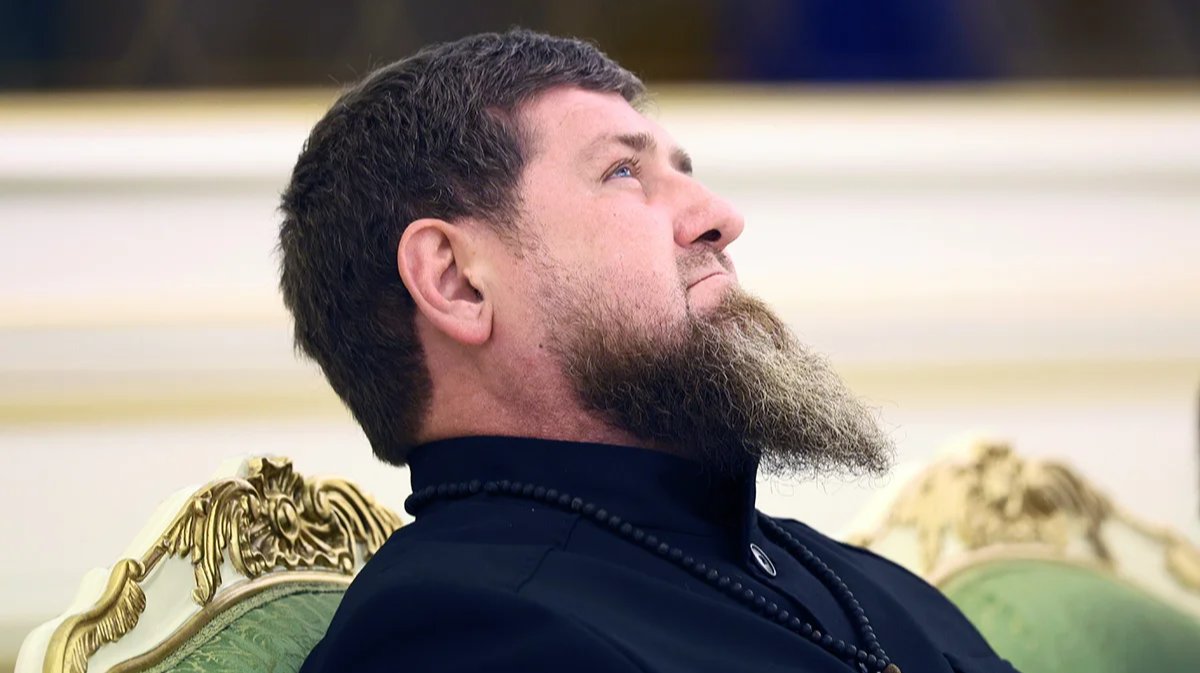The fifth and final part of the Novaya Europe series on how Chechnya’s future course is being plotted today. Who is pulling the strings and what might that future look like?
On 16 April, Chechen leader Ramzan Kadyrov announced that Apti Alaudinov, commander of the Akhmat special forces battalion, had been assigned a coveted Defence Ministry job in Moscow.
Alaudinov, whose one year and 10 months spent in Ukraine constitute his entire combat experience, was appointed a deputy at the Main Directorate for Military and Political Work — a dizzying rise up the career ladder for a man who has never actually served in the regular army and, perhaps even more significantly, the highest federal position to which anyone in Kadyrov’s entourage has ever been appointed.
While Kadyrov has always sought to ensure that local law enforcement agencies were headed by Chechens, most of the other top jobs in Chechnya are held by “outsiders”. When a Chechen Prosecutor General was appointed for the republic in 2012 — the first in almost 20 years — it was presented as a great achievement for Kadyrov, even if it was his only one.
Kadyrov suffered one of his greatest setbacks in the summer of 2022 when the Kremlin blocked his attempt to have his loyal security adviser Daniil Martynov appointed to be deputy to Viktor Zolotov, the director of Russia’s National Guard. Kadyrov ultimately had to find Martynov a job elsewhere.
One more Kadyrov man — Abubakar Edelgeriev — has worked in the Presidential Administration in Moscow for years in a vaguely defined role as adviser on climate issues. While Edelgeriev’s climate credentials may be lacking, he has both organised and attended every meeting Kadyrov’s children have held with high-ranking Kremlin officials, including one between Kadyrov’s eldest son Akhmat and Vladimir Putin in March 2023.
The appointment of Alaudinov to such a high-ranking federal post could be considered quite an achievement, but it remains to be seen whether it’s one that can be attributed to Kadyrov. It could in fact be more a case of the Kremlin positioning Alaudinov for an eventual promotion to Chechnya’s top job.
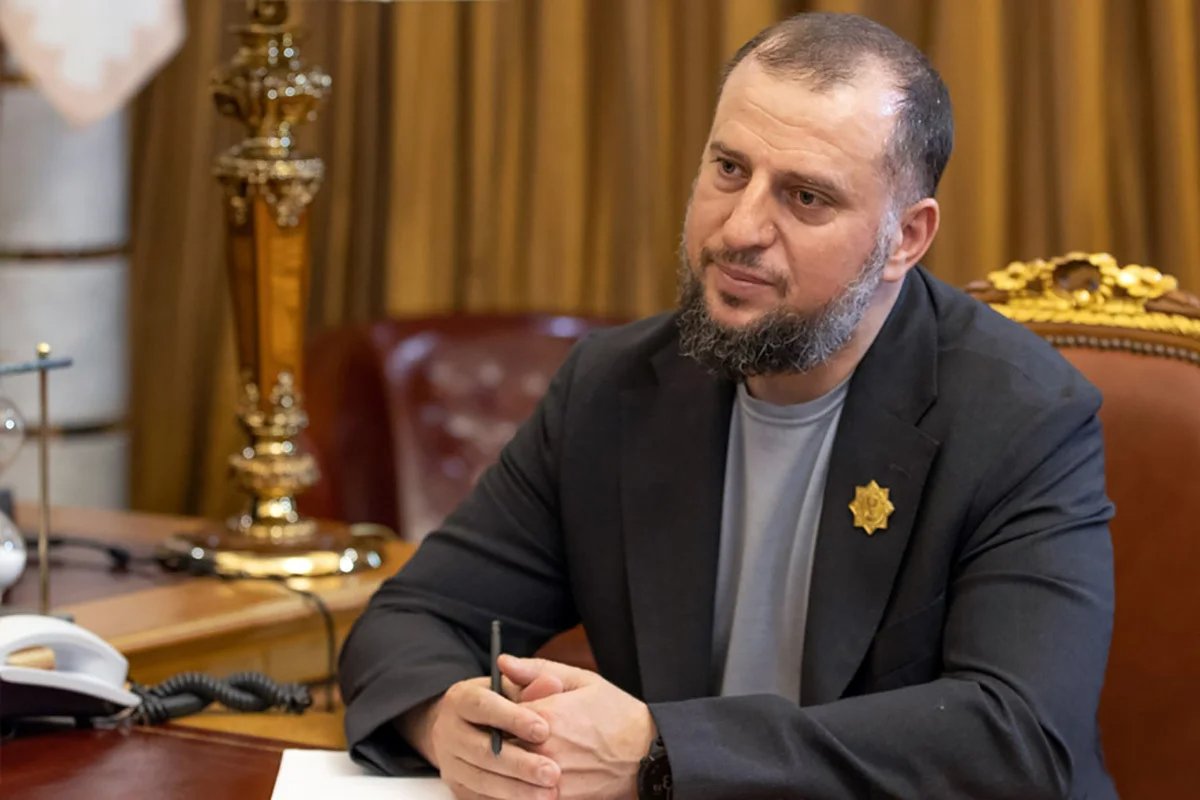
Apti Alaudinov. Photo: chechnya.gov.ru
Alaudinov’s frequent turns on national television have been key to shaping his new image. He quickly became a darling of Russia’s most monstrous propagandists, and state TV frequently reported on the Akhmat special forces, praising the achievements and personal qualities of their commander in full public view.
Indeed, Alaudinov has promptly become the second best known Chechen in Russia, and in terms of the number of interviews he’s given to Russian state media, he has long since surpassed even Kadyrov himself, both in quality and quantity. None of this would have happened without the Kremlin’s approval, of course. We can only assume that, initially at least, Kadyrov had no objection to Alaudinov’s frequent TV appearances and used them as evidence of Chechnya’s active involvement in the war in Ukraine.
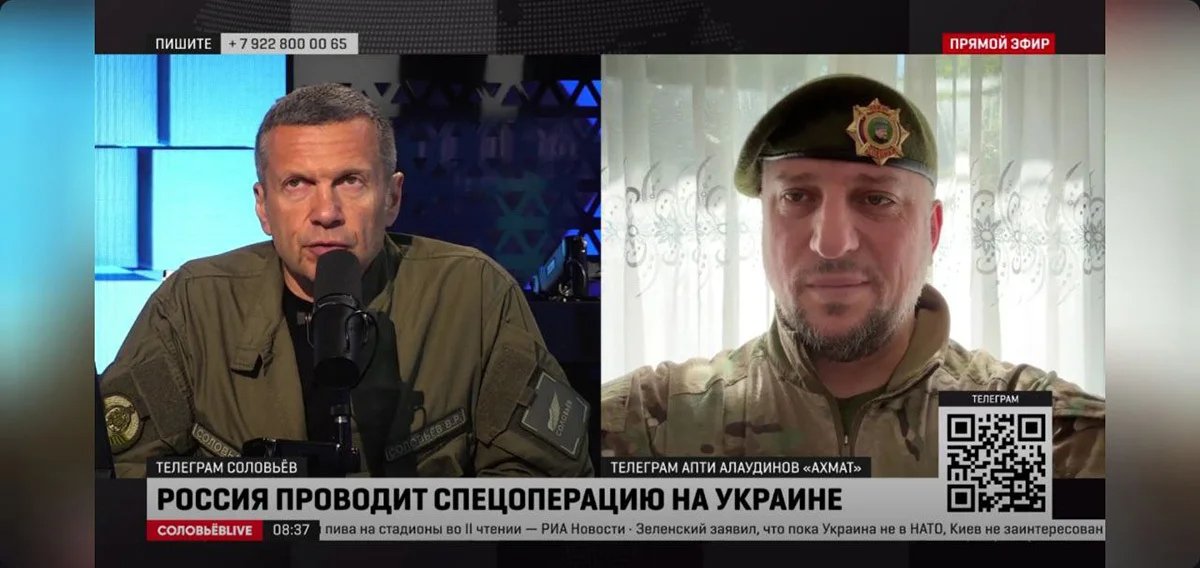
Apti Alaudinov on air with propagandist Vladimir Solovyov. Photo: video from social media
Alaudinov’s popularity in Chechnya has only increased as reports of Kadyrov’s declining health issues became frequent fixtures in the media. The task of finding a successor to Kadyrov became all the more urgent after his close brush with death last summer, and Alaudinov was a logical candidate. In addition to being a known quantity to the Russian public due to the efforts made by the principal Kremlin propagandists, Alaudinov didn't provoke the same mistrust among Russians as Kadyrov and some of his less savoury allies.
Kadyrov’s carte blanche
A shared aversion to Ramzan Kadyrov is one of the few things that self-styled “pro-war patriots” and Kremlin critics have in common, the underlying cause of which is the brazenness with which Kadyrov and his cronies flaunt the impunity they have been granted by the Kremlin in exchange for keeping Chechnya in line
Putin offered impunity to his new Chechen allies who, back then, were represented by Ramzan’s father, Akhmad, effectively giving them free rein to murder Chechen militants who fought against Russian rule, and, more importantly, to crack down on anyone who supported the Chechen underground or even the idea of Chechen independence.
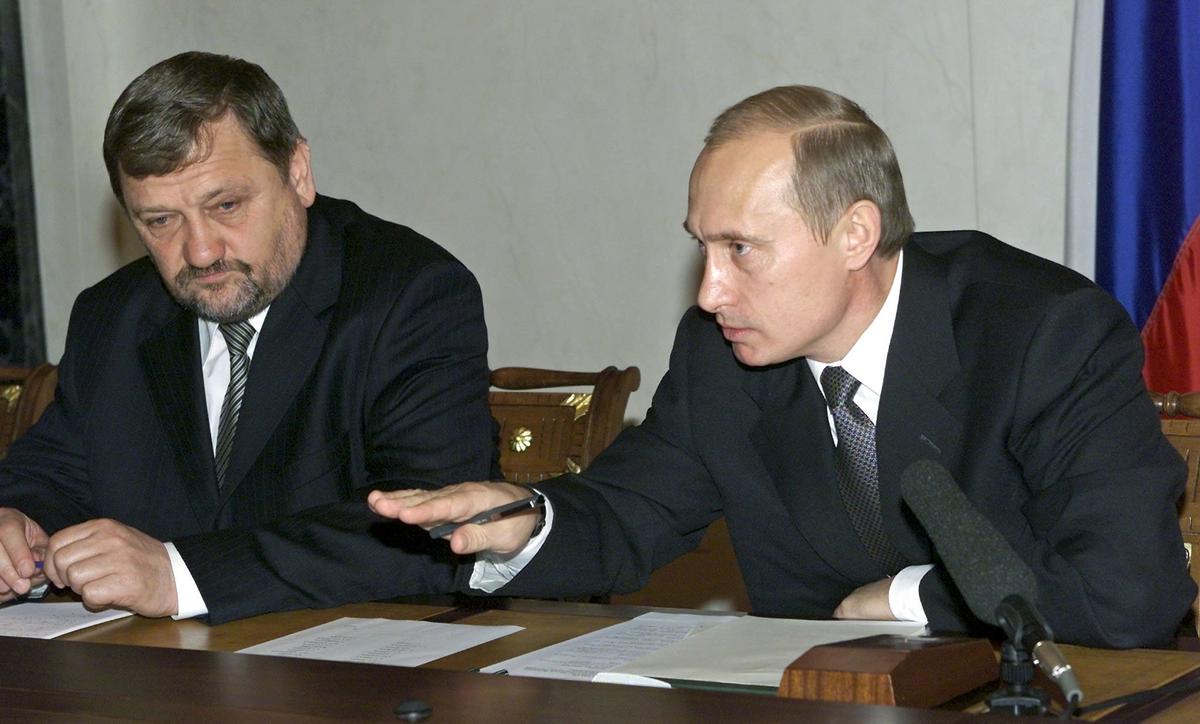
Putin and Akhmad Kadyrov at a meeting in the Kremlin, November 2002. EPA PHOTO EPA/YURI KADOBNOV
Many people believe that Ramzan Kadyrov simply inherited power after the death of his father, who was killed in an explosion in Grozny in 2004, but that couldn’t be further from the truth. In fact, after the death of Kadyrov Sr., power in Chechnya was there for the taking by whomever could prove themselves the most cruel and violent warlord of all.
The impunity Kadyrov eventually won allowed him to gradually create his own fiefdom, where Russian laws and cultural norms no longer applied.
Kadyrov used his own immunity from criminal prosecution to shield his entire entourage, confident that his untouchable status could only be ended in the event of either Putin’s death or his own.
Putin’s second chance
While it had initially seemed likely based on age alone that Kadyrov would outlive Putin and that cleaning up the mess Kadyrov has made of his years in charge of Chechnya would fall to Putin’s eventual successor, the bombshell of Kadyrov’s terminal illness has changed everything and has forced Putin back to the drawing board in his attempts to solve the “Chechen issue”.
As a change of power looms in Grozny, even a cursory glance at the current political landscape in Chechnya would suggest that Putin’s only real option is to radically alter the current form of governance. Only by returning Chechnya to the federal fold and ensuring that it observes the rule of law to at least a similar degree as the rest of the country, can any stability be guaranteed.
Appointing an outsider to head Chechnya could backfire and lead to all the serious players in the republic joining forces against the federal government.
That would threaten armed conflict, given that the republic is awash with weapons and its leaders have become emboldened by their own impunity.
Nevertheless, Chechnya is unlikely to see a return to its separatist past. Putin’s tactics for pacifying Chechen separatists may not have completely put an end to their aspirations, but it did a pretty good job of neutralising them. Furthermore, Chechen separatism has largely been superseded by the Islamisation of Chechnya and the North Caucasus as a whole, a process that started at the same time as the war for independence.
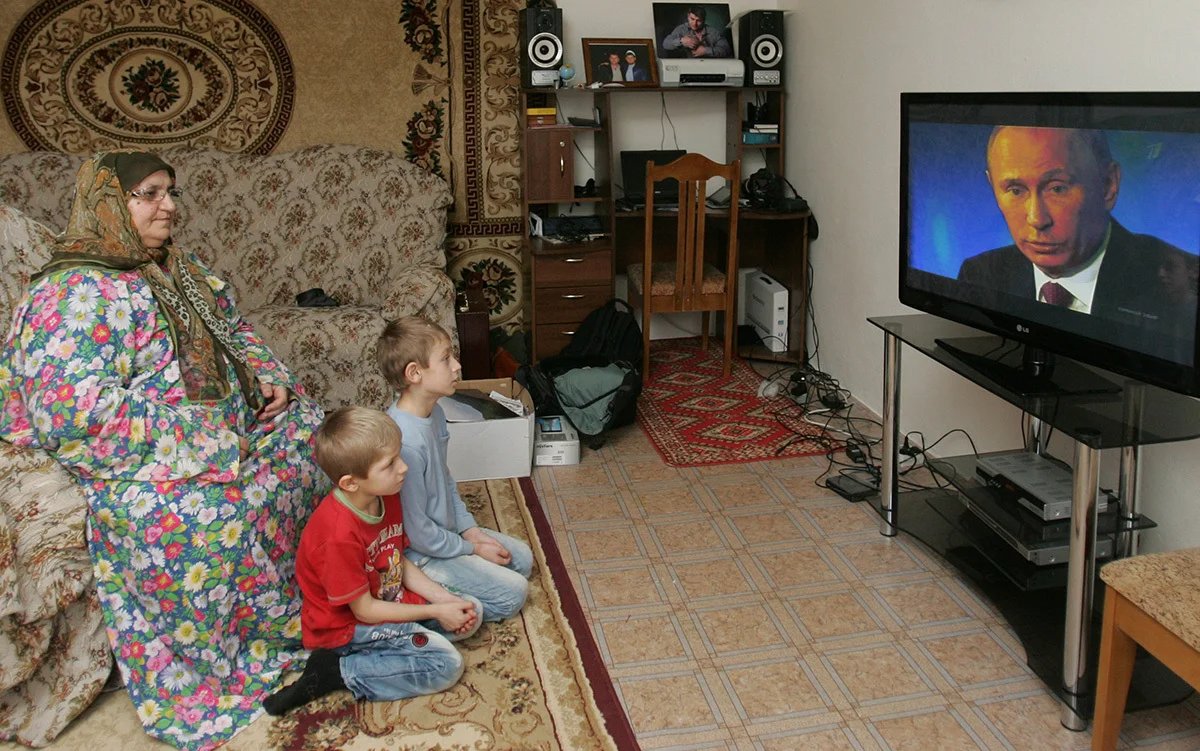
A Chechen woman and her grandchildren watch a live broadcast of a Putin press conference in the village of Alkhan-Kala, near the Chechen capital Grozny, 20 December 2012. Photo: Kazbek Vakhaev / EPA
With a change in how the republic is run, a peaceful transition from the current “state within a state” with its own armed forces and a completely opaque financial system that Moscow has no control over could at least be hoped for. Before anything else, the federal institutions sidelined by Kadyrov, principally law enforcement agencies in the republic, urgently require resurrecting and strengthening.
Kadyrov has always kept a beady eye on the federal institutions that re-emerged in the republic after the two wars. Unwilling to brook the existence of rival power bases in his fiefdom, Kadyrov remade the republic’s police force as an all-Chechen agency personally loyal to him.
The Chechen Federal Security Service (FSB) is the largest of all the regional directorates in the country, with about 1,700 staff in total, the purview of which is exclusively assisting Kadyrov in the fight against terrorism. The FSB does not interfere in other Chechen affairs, limiting itself to gathering dirt on influential Chechens and their families, which it has reportedly done with gusto — Chechen FSB safes are said to be full of this compromising material, ready for use whenever necessary.
‘Things won’t be like they were’
According to Novaya Gazeta Europe’s source in the FSB, the Kremlin is likely to target Interior Ministry officials when power changes hands in Chechnya, among them the current Chechen Interior Minister, Aslan Iraskhanov. Controlling key security officials in Chechnya by threatening them with criminal prosecution will be “the most effective method” for the Russian government to reassert its authority in the republic, the source added.
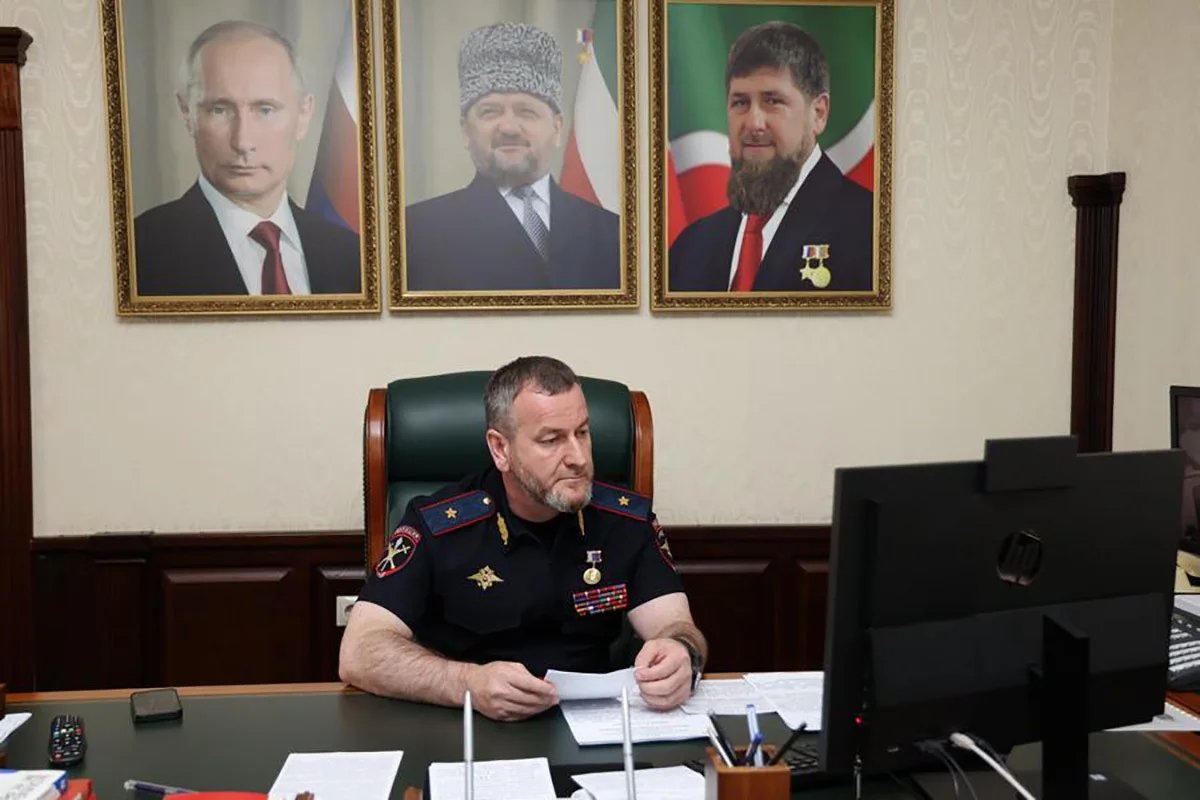
Chechen Interior Minister Aslan Iraskhanov. Photo: social media
“When change comes to Chechnya, the key position will be Interior Minister. That will be Moscow’s primary interest as it will have to immediately resolve the issue with Kadyrov’s armed guard, who are officially police officers,” the source said.
The Investigative Committee, which prosecutes serious crimes, has enough evidence to tie Iraskhanov to the alleged extrajudicial killing of at least 27 Chechens detained in December 2016 and January 2017, and it would easily be able to start criminal proceedings when needed, the source suggested.
The likely post-Kadyrov scenario in Chechnya is the replacement of several Kadyrov allies currently in key posts by officials loyal to the Kremlin. If the Kadyrovites put up a fight, they will be offered a stark choice: Ukraine or the dock. “Things won’t be like they were,” our source concluded.
Join us in rebuilding Novaya Gazeta Europe
The Russian government has banned independent media. We were forced to leave our country in order to keep doing our job, telling our readers about what is going on Russia, Ukraine and Europe.
We will continue fighting against warfare and dictatorship. We believe that freedom of speech is the most efficient antidote against tyranny. Support us financially to help us fight for peace and freedom.
By clicking the Support button, you agree to the processing of your personal data.
To cancel a regular donation, please write to [email protected]
